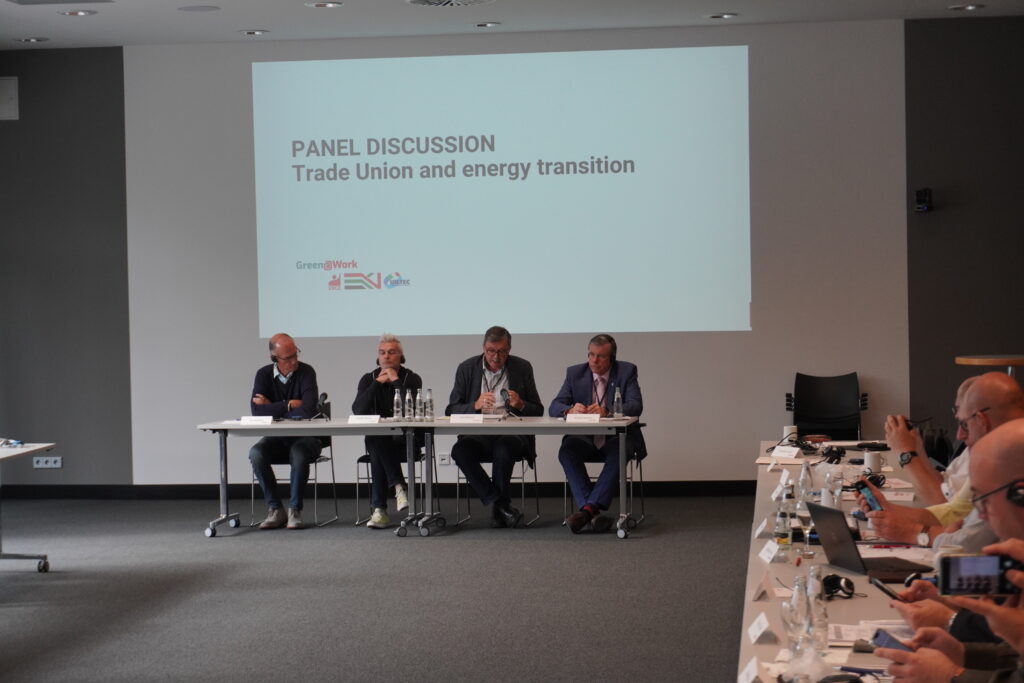The main conference in Hanover (September 13-16, 2022) focused on the joint development of demands. Following points were compiled from the first expert online meeting in March 2022.

(1) Social dialogue on the transformation of the energy industry
The Italian Manifesto for Energy Transformation was adopted in 2021 under the government of Mario Draghi and contains guidelines but also action steps for a successful socio-ecological transformation. The action steps are described in detail; however, only how, but not when, they are to be implemented was specified. This is also due to the multiple crises that currently need to be addressed.
The manifesto is the result of a trialogue between social partners, politics and business.
The latest collective bargaining negotiations were also guided by the contents of the manifesto, as individual points concern important trade union practices.
The Manifesto has laid a good foundation for further discussions between the state, business and the social partners.
In Germany, discussion circles are formed on an ad hoc basis, which are then established and continued for the ongoing trialogue. These are several circles acting simultaneously. There has not yet been a consolidation of the discussion results, as in a manifesto.
Nevertheless, there are also implications for trade union concerns, such as collective bargaining. In the German energy industry, however, collective bargaining is about more than pay. Factors such as price explosions, supply and livelihood security are also coming into focus as a result of the desired green transformation. The social partners‘ cries for help are loud. Policymakers must respond in an improved manner.
In Croatia, the topic of green transformation is not on the agenda of the social dialogue. There is still too little information and too little interest. A large part of the employers are not interested in further training in this area. In addition, the unions are small and compete with each other. The employers primarily pursue their own interests and the trade unions try to participate in legislation and in the education and training of skilled workers, but are mainly concerned with securing jobs.
Thus, there are hardly any platforms for action at the national level. For smaller countries, such as Croatia, these must be created at the EU level.
But even at the EU level, Croatia, like many smaller countries, receives little attention. The EU-wide green transformation is a good goal. Croatia has many good professionals and has a lot of potential, but it lacks the financial resources for training to use new technologies.
The problem is that there is an unfair distribution of support and finances in the EU. The demand is the same for all, the small countries have to keep up, although they would need much more support than the big ones.
(2) Multiple crises have an impact on transformation processes
The year 2022 has brought with it special challenges. Multiple crises form an increasingly powerful variable for transformation that cannot be defined. An example of this is also the sanctions against Russia announced by Ursula von der Leyen.
The crisis situations (Corona pandemic, war in Ukraine) have caused many changes, making it impossible to keep certain plans of green transformation; or to (have to) focus on other issues selectively.
In Italy, for example, the plans of decarbonization will not be kept. This is a common problem for all (European) industrialized countries.
(3) Green Deal as a pan-European task
Supply chains have to be strengthened again within Europe or sites have to be brought back to Europe.
One example is the supply of medicines. Even before the pandemic, there was a shortage of medical supplies because a large part of the production of active ingredients had moved to India and the production supply chain was not functioning properly. A (mainly) European production means chain could insure more stability.
In addition, there will be a big fight for markets in the next few years, with China being very assertive. However, products that would otherwise be produced in China or India can be produced in an environmentally friendly way within the EU.
The European Green Deal can only be achieved as an overall concept for Europe. Alternative projects such as Desert-Tec, should be brought back into focus.